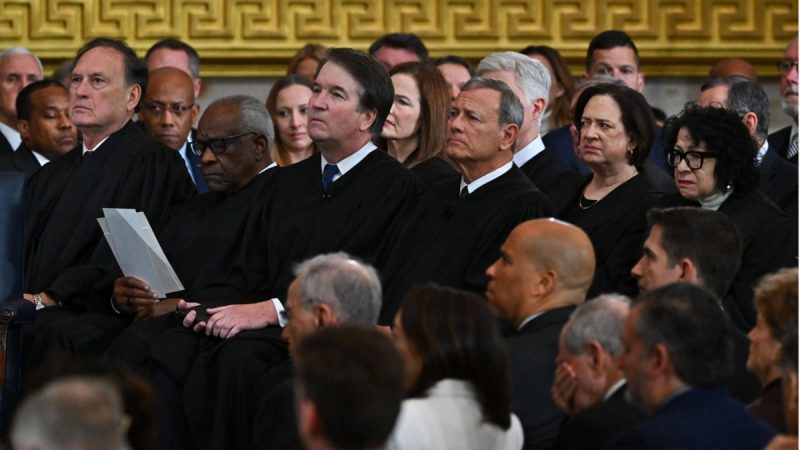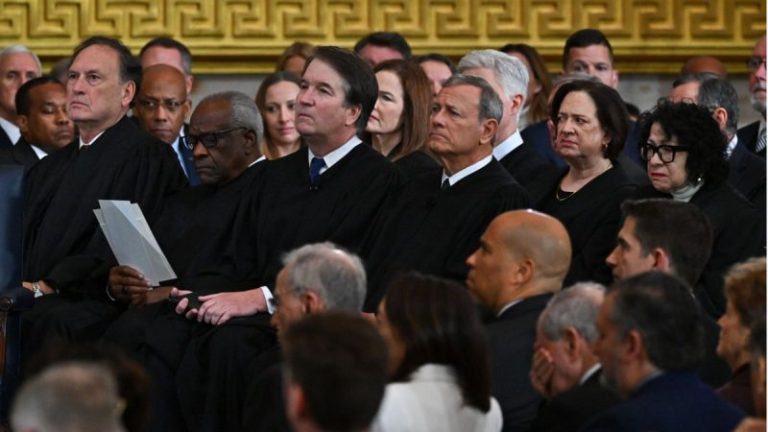
The Supreme Court on Friday ordered additional arguments in a major case centered on whether race can factor into drawing congressional maps, a clear sign that redistricting remains top-of-mind for the justices ahead of the 2026 midterms.
Justices ordered both parties in Louisiana v. Callais to return for additional arguments next term. At issue is whether Louisiana’s latest congressional map — which includes the creation of a second, majority-Black district — should be considered an unconstitutional ‘illegal racial gerrymander.’
The Supreme Court order comes months after justices first heard oral arguments in the case in March. It requires both parties to file supplemental briefs by mid-September, outlining in further detail their view of whether Louisiana’s intentional creation of a second majority-minority congressional district ‘violates the Fourteenth or Fifteenth Amendments to the U. S. Constitution.’
Reply briefs should be filed no later than Oct. 3, the Supreme Court said in the unsigned, single-page order — just three days before the high court gavels in for the 2025-2026 session.
The order comes after the Supreme Court in June said they would not decide the case this term as had been expected — punting it to the fall for further consideration. At the time, the justices said they needed more information before ruling on the case.
The issue underscores the challenges states face with congressional redistricting.
Louisiana has revised its congressional map twice since the 2020 census. The first version, which included only one majority-Black district, was blocked by a federal court in 2022. The court sided with the Louisiana State Conference of the NAACP and other plaintiffs, ruling the map diluted Black voting power and ordering the state to redraw it by January 2024.
The new map, S.B. 8, created the second Black-majority district at the center of the Supreme Court case. However, S.B. 8 was almost immediately challenged by a group of non-Black plaintiffs in court, who took issue with a new district that stretched some 250 miles from Louisiana’s northwest corner of Shreveport to Baton Rouge, in the state’s southeast.
They argued in the lawsuit that the state violated the equal protection clause by relying too heavily on race to draw the maps, and created a ‘sinuous and jagged second majority-Black district.’
That map remains in place for now, until the Supreme Court can hear the additional information submitted to the court this fall.
Oral arguments in March focused heavily on whether Louisiana’s redistricting efforts were narrowly tailored enough to meet constitutional requirements and whether race was used in a way that violated the law, as appellees had alleged.
The high court’s request for additional information comes at a pivotal time for the U.S., as new and politically charged redistricting fights have popped up in other U.S. states ahead of next year’s midterm elections.
In Texas, tensions reached a fever pitch this week after Democratic state legislators fled the Lone Star State to block Texas Gov. Greg Abbott’s ability to convene a legislative quorum needed to pass the state’s aggressive new redistricting map, which would create five additional Republican-leaning districts.
Under the state’s constitution, two-thirds of the House legislators must be present for the body to conduct business. With an eye to this rule, Democratic lawmakers fled the state to Chicago, New York and Boston — beyond the reach of Texas authorities and of Abbott, who has little power in the near-term to compel their returns.
The governor has, however, threatened to take them to court to have them removed from office altogether.
In a press conference Monday, New York Gov. Kathy Hochul stressed the magnitude of the redistricting efforts, and vowed to explore ‘every option’ in redrawing state lines.
‘We are at war,’ Hochul said, speaking alongside the six Texas Democrats who fled to her state.
‘And that’s why the gloves are off — and I say, bring it on,’ she added.
The move is part of a broader redistricting push aimed at helping Republicans defend their slim House majority. As with most midterms following a new president’s election, 2026 is expected to serve as a referendum on the White House — raising GOP concerns that they could lose control of the chamber.

